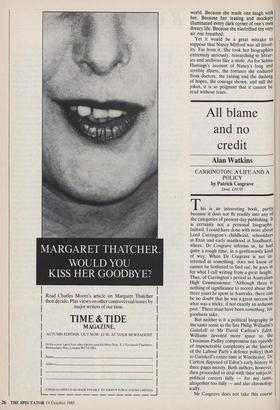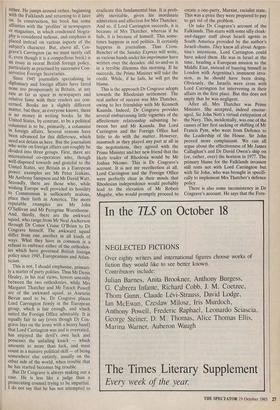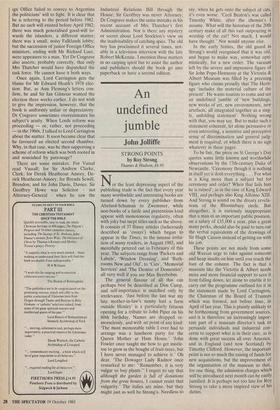All blame and no credit
Alan Watkins
CARRINGTON: A LIFE AND A POLICY by Patrick Cosgrave Dent. £10.95 This is an interesting book, partly because it does not fit readily into any of the categories of present-day publishing. It is certainly not a personal biography. Indeed, I could have done with more about Lord Carrington's childhood, schooldays at Eton and early manhood at Sandhurst, where, Dr Cosgrave informs us, he had quite a rough time, in a gentlemanly kind of way. When Dr Cosgrave is not in- terested in something, does not know or cannot be bothered to find out, he goes in for what I call writing from a great height. Thus, of Carrington's period as Australian High Commissioner: 'Although there is nothing of significance to record about the three years he spent in Australia, there can be no doubt that he was a great success in what was a tricky, if not exactly an arduous post.' There must have been something, for goodness sake.
But neither is it a political biography in the same sense as the late Philip Williams's Gaitskell or Mr David Carlton's Eden. Williams devoted more space to the Crossman-Padley compromise (an episode of impenetrable complexity in the history of the Labour Party's defence policy) than to Gaitskell's entire time at Winchester. Dr Carlton disposed of Eden's early history in three pages merely. Both authors, however, then proceeded to deal with their subjects' political careers fully — for my taste, altogether too fully — and also chronolog- ically. Mr Cosgrave does not take this course either. He jumps around rather, beginning with the Falklands and returning to it later on. In construction, his book has some affinities with the 'profiles' in newspapers or magazines, in which condensed biogra- phy is considered tedious, and emphasis is placed instead on various aspects of the subject's character. But, above all, Cos- grave's Carrington (as we must surely call it, even though it is a compedious book) is an essay in recent British foreign policy, particularly as practised by successive Con- servative Foreign Secretaries.
Since 1945 journalists specialising in diplomacy and foreign affairs have fared none too prosperously in Britain, at any rate as far as space in newspapers and relative fame with their readers are con- cerned. Books are a slightly different matter, but then, as everyone knows, there is no money in writing books. In the United States, by contrast, to be a political columnist is to be, primarily, a columnist in foreign affairs. Several reasons have been advanced for this difference, which need not detain us here. But the journalists who write on foreign affairs can roughly be divided into three groups. First, there are international co-operators who, though well-disposed towards and grateful to the United States, see Britain as a European power: examples are Mr Peter Jenkins, Mr Anthony Sampson and Mr David Watt. Secondly, there are those who, while wishing Europe well provided its hostility to Communism is sufficiently zealous, place their faith in America. The more reputable examples are Mr John O'Sullivan and Mr Peregrine Worsthorne. And, thirdly, there are the awkward squad, who range from Mr Neal Ascherson through Dr Conor Cruise O'Brien to Dr Cosgrave himself. The awkward squad differ from one another in all kinds of ways. What they have in common is a refusal to embrace either of the orthodox- ies which have governed British foreign policy since 1945, Europeanism and Atlan- ticism.
This is not, I should emphasise, primari- ly a matter of party politics. Thus Mr Denis Healey, in his real views, hovers uneasily between the two orthodoxies, while Mrs Margaret Thatcher and Mr Enoch Powell are of the awkward squad, as Aneurin Bevan used to be. Dr Cosgrave places Lord Carrington firmly in the European group, which is fair enough, and which suited the Foreign Office admirably. It is equally fair to say (even though Dr Cos- grave lays on the irony with a heavy hand) that Lord Carrington was and is overrated, has enjoyed the devil's own luck and possesses the unfailing knack — which amounts to more than luck, and must count as a massive political skill — of being somewhere else entirely, usually on the other side of the world, when trouble that he has started becomes big trouble.
But Dr Cosgrave is always making out a case. He is less like a judge than a prosecuting counsel trying to be impartial. I do not say that he has not attempted to
eradicate this fundamental bias. It is prob- ably inevitable, given his inordinate admiration and affection for Mrs Thatcher. And so, if Lord Carrington succeeds, it is because of Mrs Thatcher, whereas if he fails, it is because of himself. This some- times happens in real politics. It certainly happens in journalism. Thus Cross- Bencher of the Sunday Express will write, as various hands under his imprimatur have written over the decades: old so-and-so is in a terrible dilemma this morning. If he succeeds, the Prime Minister will take the credit. While, if he fails, he will get the blame.
This is the approach Dr Cosgrave adopts towards the Rhodesian settlement. The real author of success was Mrs Thatcher, owing to her friendship with Mr Kenneth Kaunda. Indeed, Dr Cosgrave provides several embarrassing little vignettes of the affectionate relationship subsisting be- tween her and Mr Kaunda. But Lord Carrington and the Foreign Office had little to do with the matter. However, inasmuch as they played any part at all in the negotiations, they agreed with the Prime Minister and her new friend that the likely leader of Rhodesia would be Mr Joshua Nkomo. This is Dr Cosgrave's account. It is not my recollection at all. Lord Carrington and the Foreign Office were perfectly clear in their minds that Rhodesian independence would probably lead to the elevation of Mr Robert Mugabe, who would promptly proceed to create a one-party, Marxist, racialist state. This was a price they were prepared to pay to get rid of the problem.
Or take Dr Cosgrave's account of the Falklands. This starts with some silly cloak- and-dagger stuff about Israeli agents in South America provided by the author's Israeli chums. They knew all about Argen- tina's intentions. Lord Carrington could have asked them. He was in Israel at the time, heading a European mission to the Middle East, instead of busying himself in London with Argentina's imminent inva- sion, as he should have been doing. Obviously, the Israelis were cross with Lord Carrington for intervening in their affairs in the first place. But this does not imply that he was negligent.
After all, Mrs Thatcher was Prime Minister. She accepted, indeed encour- aged, Sir John Nott's virtual extirpation of the Navy. This, incidentally, was one of the causes of her first sacking or shifting of Mr Francis Pym, who went from Defence to the Leadership of the House. Sir John proved more complaisant. We can all argue about the effectiveness of Mr James Callaghan's and Dr David Owen's ship on (or, rather, over) the horizon in 1977. The primary blame for the Falklands invasion still rests not with Lord Carrington but with Sir John, who was brought in specifi- cally to implement Mrs Thatcher's defence policy.
There is also some inconsistency in Dr Cosgrave's account. He says that the Fore- ign Office failed to convey to Argentina the politicians' will to fight. It is clear that he is referring to the period before 1982. But no such will existed before April 1982; there was much generalised good-will to- wards the islanders, a different matter; there was a small, noisy Falklands lobby; but the succession of junior Foreign Office ministers, ending with Mr Richard Luce, were appeasers to a man. Yet Dr Cosgrave also asserts, probably correctly, that only Mrs Thatcher would have dispatched the task force. He cannot have it both ways.
Once again, Lord Carrington gets the blame for Mr Edward Heath's 1974 elec- tion. But, as Ann Fleming's letters con- firm, he and Sir Ian Gilmour wanted the election three weeks earlier. I do not wish to give the impression, however, that the book is uniformly unfair or depreciatory. Dr Cosgrave sometimes overestimates his subject's acuity. When Lords reform was proceeding — or, rather, not proceeding — in the 1960s, I talked to Lord Carrington about the matter. It soon became clear that he favoured an elected second chamber. Why, in that case, was he then supporting a scheme of reform which was both rooted in and nourished by patronage?
There are some mistakes. For Vassal read Vassall; for Sir Andrew Clarke, Clark; for Derek Heathcoat Amory, De- rick Heathcoat-Amory; for Brenda Sewill, Brendon; and for John Davis, Davies. Sir Geoffrey Howe was Solicitor - not Attorney-General - when he saw the
Industrial Relations Bill through the House; Sir Geoffrey was never Attorney; Dr Cosgrave makes the same mistake in his recent account of Mrs Thatcher's first Administration. Nor is there any mystery or secret about Lord Stockton's view on the inadvisability of catching spies. The old boy has proclaimed it several times, not- ably in a television interview with the late Robert McKenzie. I mention these matters in no carping spirit but to assist the author and publishers should the book go into paperback or have a second edition.




















































 Previous page
Previous page